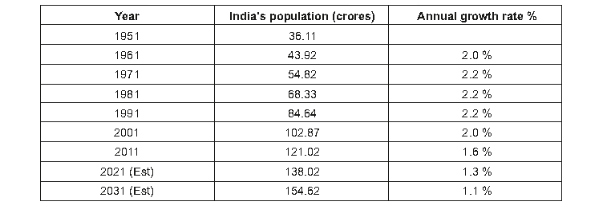
The stock market index with the longest track record in India is the BSE Sensex. The index has returned about 16.14% per annum since 1979. Including dividends, the total return from the BSE Sensex
between 1979 and 2016 has been around 17.5% per annum. During the same period, India's economy (as measured by the nominal GNP) has grown by 13.7% per annum. The sector-wise growth of India's economy during this period has been as follows:

Data source: Economic Survey.
India's stock market is more influenced by manufacturing, trade finance and services since these enterprises tend to be listed on stock exchanges more. These sectors have grown at about 14.5% to 15.5% per annum. It is presumed that the more efficient amongst these (i.e., those represented by the index) would have grown at about 2% more than the average, leading to a long-term match between economic growth and stock market returns.
If we expect India's economy to sustainably grow at a real rate of 6.5% to 7.0% over the next several years, this means we expect the nominal growth rate to be around 13.5% to 14.5%. (The average inflation in India has been around 7.8% p.a. over the past 30 years, and in the recent past, it has been 7.7% p.a. over the past 5 years).
We can reasonably expect industry, trade and services to grow at slightly higher growth rates compared to the overall economy. We can therefore assume that these sectors that are directly linked to the stock market can grow at 14.5-15.5%. The more efficient amongst these would probably grow at 1-2% more. At the same time, the cost of funds today is lower than what it has been over the past three decades. Economic information too is more freely available than it was several years ago. Therefore, (assuming that our economy grows at a sustainable rate of 6.5 -7.0% p.a.), it is reasonable to expect that the average growth rate of our stock market index over the next several years would not be much different from the long-term growth rate the index has seen in this country.
In order to be confident of a decent growth in the economy, we have to satisfy ourselves that the ingredients that enable a decent growth do exist in our country.
Any discussion about the economy is incomplete without a discussion about the population. We do not intend to bore you with more data on the age profiles of our population, or claim how young our population is. Enough has been written about the country's demographic dividend.
Instead, let us focus on the following:

Data sources: (1) Government Census statistics
(2) Population Foundation of India (estimates)

Data sources: worldbank.org
If we estimate our real GDP over the next several years to sustainably grow by 6.5 to 7.0% per annum, and if we agree with the projection that our population will grow by 1.1% per annum, then this means that the real GDP per capita in this country will grow by about 5.3 to 5.8% per annum.
The implication of this assumption is that we can expect the next generation of Indians to be at least three times as rich (after adjusting for inflation) compared to the present generation. (Of course, higher per capita GDP does not automatically imply equitable distribution of wealth. We have to periodically see whether there are checks and balances to enable this).
For an equity investor, this has tremendous implications. There are reasons to believe that the economic growth over the next several years will be a healthy combination of consumer demand-led growth and capital expenditure-led growth. This means that physical infrastructure in India will improve over the next many years, leading to growth in businesses that are linked to such activity.
The writer is executive director & CIO – equities, DHFL Pramerica Asset Managers Pvt Ltd